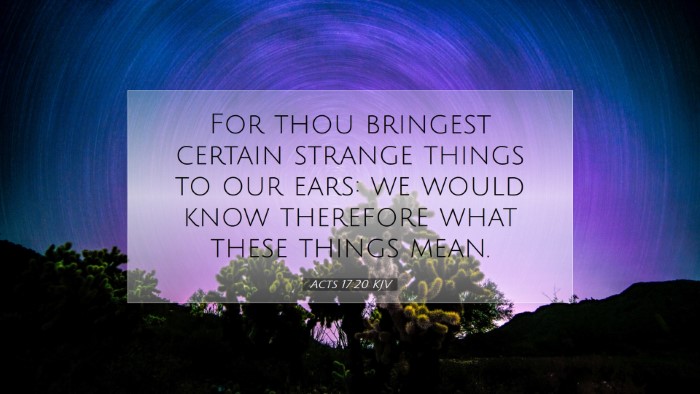Commentary on Acts 17:20
Verse: Acts 17:20 - "For you bring certain strange things to our ears: we would know therefore what these things mean."
Introduction
The account in Acts 17 describes Paul's visit to Athens, a city steeped in philosophy, idolatry, and cultural sophistication. This verse specifically reflects the Athenians' reaction to Paul's teachings about Jesus and the resurrection, which they initially considered "strange." The dynamic environment of discourse in Athens serves as a backdrop for significant theological exploration.
Contextual Framework
Paul's ministry in Athens highlights the intersection of faith and reason. As he engages with philosophers at the Areopagus, we witness the early church's confrontation with the prevailing worldview of ancient Greece. The term “strange things” signifies not merely their novelty but their challenge to established beliefs.
Insights from Matthew Henry
Matthew Henry emphasizes the contrast between the wisdom of the world and the foolishness of the gospel. He notes that the Athenians, characterized by their philosophical inquiry, were intrigued by Paul’s proclamation of the resurrection. Henry interprets their request for clarification as indicative of the human heart’s longing for truth amid confusion. The “strange things” reveal the radical nature of the gospel, which disrupts common understanding and invites deeper engagement with divine revelation.
Insights from Albert Barnes
Albert Barnes elaborates on the Athenians’ intellectual culture, highlighting their penchant for new ideas and discussions. He suggests that they were not dismissive but rather curious about Paul’s message. Barnes points out that the Athenian philosophers were accustomed to fictitious gods, and the introduction of a singular resurrection challenged their polytheistic beliefs. This verse underscores the importance of addressing misconceptions while imparting spiritual truths to an audience entrenched in diverse theological perspectives.
Insights from Adam Clarke
Adam Clarke provides a detailed examination of the etymology of “strange” (xenon) and how it conveys the foreignness of Paul’s doctrine. Clarke posits that the message of the resurrection was not only an affront to their existing beliefs but also an invitation to reconsider their understanding of life, death, and divinity. He stresses that their inquiry represents a pivotal moment in the advancement of the gospel as it crosses cultural boundaries and stimulates theological dialogue.
Theological Implications
This verse invites pastors and theologians alike to reflect on the nature of revelation and how it is received by different cultures. It serves as a reminder that the truth of the gospel can appear strange or foreign to those unacquainted with its principles. Understanding this reaction is crucial for effective evangelism and discipleship.
- Cultural Context: Engaging with diverse cultures requires sensitivity and awareness of prevailing philosophies.
- Intellectual Engagement: Christians are called to defend their faith through reasoned discourse, as exemplified by Paul.
- Receptivity to Truth: The willingness of the Athenians to explore new ideas challenges churches to foster environments where questions can be asked without fear.
Practical Applications
For pastors and church leaders, Acts 17:20 serves as a clarion call to adapt their teaching methods to resonate with contemporary audiences. This involves:
- Creating Dialogue: Establish forums for discussion where both believers and non-believers can reflect on the gospel’s implications.
- Addressing Doubts: Encourage congregants to voice their uncertainties, recognizing that questions are often the precursor to deeper faith.
- Studying Cultural Narratives: Become familiar with the cultural frameworks of communities to present the gospel in relatable terms without compromising its truth.
Conclusion
Acts 17:20 is a pivotal verse that encapsulates the challenge and opportunity of communicating the gospel in a pluralistic society. By drawing on insights from historical commentaries, we gain a profound understanding of how to approach the complexities of faith in a world rife with competing ideologies. Pastors, students, and scholars are encouraged to embrace the unknowns of faith as a means to explore the depths of divine truth and cultivate a spirit of inquiry within their communities.


